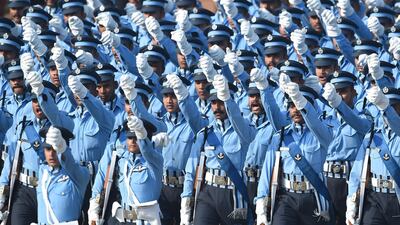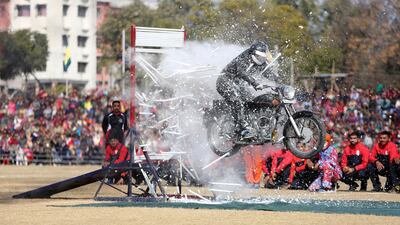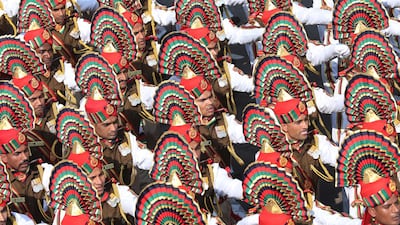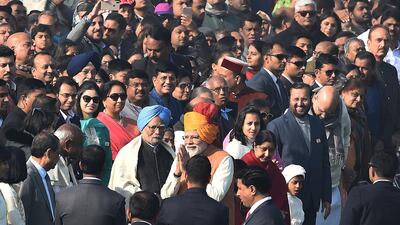India celebrates Republic Day on January 26 every year to commemorate the adoption of the constitution in 1950, when the former South Asian British colony transformed into a sovereign, democratic and republic nation after gaining freedom in 1947.
The day is considered a significant moment in the modern history of the world’s largest democracy that witnessed the transfer of power from the post-independence monarchy to the Indian people.
It has become an occasion to celebrate the democratic traditions and military might of the South Asian powerhouse as well as its cultural and regional diversity.
Taking place on Thursday, this year's 74th Republic day, like before, will be marked with a grand military and cultural parade on Kartavya Path, the newly refurbished three-kilometre-long broadway, part of Prime Minister Narendra Modi’s ambitious Central Vista project in the heart of the capital New Delhi.
The event is taking place after a two-year pause due to the pandemic and is set to be attended by India’s newly appointed President Droupadi Murmu, Mr Modi, his cabinet colleagues, opposition leaders, foreign diplomats and the Republic Day chief guest Egyptian President Abdel Fattah El Sisi.
Why is Republic Day celebrated?
India’s independence movement leaders, including Mahatma Gandhi, Jawarharlal Nehru among others, believed that the country should have a sovereign, democratic and republic government. But even after its independence, India remained under a monarchy as it was under British Commonwealth.
After Nehru became the first Prime minister of independent India and cobbled a cross ideological government, the country began drafting a new Constitution through a long and complex process that involved input from leaders of various political and social groups.
The Constitution took about three years of drafting and on January 26, 1950, it was officially adopted and India was declared a republic.
How is it celebrated in India?
India showcases its defence capacities on the day, displaying its state-of-the-art land, aerial and sea military equipment to the world.
It is a tradition to pay homage to the fallen soldiers at the war memorial.
The annual national event begins with a 21-gun salute. It is followed by the President hoisting the national flag and singing the national anthem in presence of thousands of citizens.
The celebrations begin with the winners of gallantry awards saluting the President in open military jeeps, followed by the display of fighter jets, missiles and military gadgets that roll down the broadway amid public cheers and jubilation.
A march-past of different regiments of the armed forces, police and paramilitary is followed. The President, who is also the Commander-in-Chief of the Indian Armed Forces, takes the salute.
For decades, soldiers wielding assault rifles and mounted on decorated camels have become a highlight of the parade.
The camel mounted soldiers guard the hostile Thar desert along the Pakistan border. Other military contingents showcase acrobatic skills and daredevils, the Indian Army perform stunts on motorbikes such as making human pyramids and riding bikes over fire rings.

The military display gives way to cultural and regional floats representing various states and cultural groups, as well as performances by musicians and dancers.
A vibrant parade comprising tableaux from different states showcases cultural diversity and history of various Indian states.
Thousands of schoolchildren perform dance and exhibit cultural activities on the broadway that connects the Iconic India Gate to the President’s House.
Smaller events, including paramilitary and police parades are organised in the state capitals where the state governors hoist the Indian flag and take the salute.
Who attends the Republic Day celebrations?
Over the last 74 years, many high profile global dignitaries have become part of India's republic day celebrations. The chief guest is usually the head of state or government of a country. The invitation is considered a great honour, as it is seen as an opportunity for the country to strengthen its relationship with New Delhi.
Indonesian President Sukarno was the first chief guest at the 1950 Republic Day. It was followed by King Tribhuvan Bir Bikram Shah of Nepal.
New Delhi invited Pakistan’s Governor-General Malik Ghulam Muhammad in 1955. Duke of Edinburgh Prince Philip attended the 1959 Republic day followed by Queen Elizabeth II in 1961.
Chief of Defence Staff Lord Louis Mountbatten, who was the viceroy of colonial India in 1947 and later its governor-general until 1948, returned as chief guest at the Republic Day in 1964.

King Mohammed Zahir Shah of Afghanistan was the chief guest in 1967.
Nelson Mandela, the first South African President was the chief guest in 1995. Saudi King Abdullah bin Abdulaziz Al Saud in 2006, Russian President Vladimir Putin in 2007 and French President Nicolas Sarkozy in 2008.
Japanese Prime Minister Shinzo Abe in 2014 and US President Barack Obama in 2015. The UAE's President Sheikh Mohamed, who was Crown Prince of Abu Dhabi and Deputy Supreme Commander of the Armed Forces at the time, visited in 2017.
Former Brazilian President Jair Bolsonaro was the chief guest at the 2020 Republic Day. British Prime Minister Boris Johnson cancelled his visit due to Covid in 2021.

















